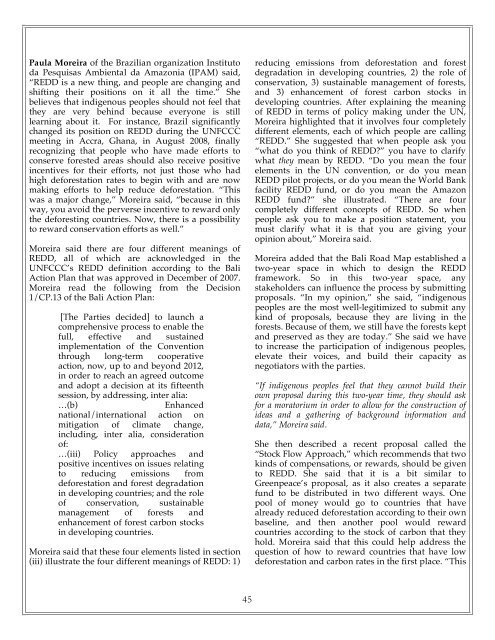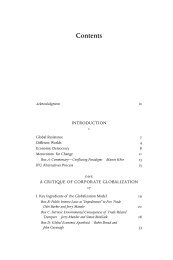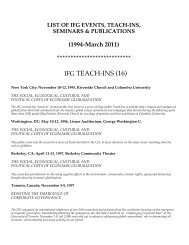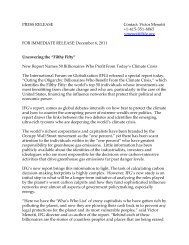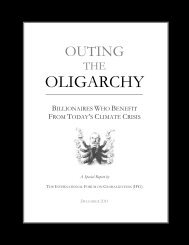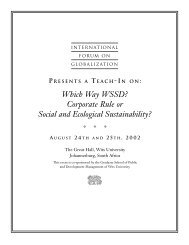UNDRIP Report - English FINAL - International Forum on Globalization
UNDRIP Report - English FINAL - International Forum on Globalization
UNDRIP Report - English FINAL - International Forum on Globalization
You also want an ePaper? Increase the reach of your titles
YUMPU automatically turns print PDFs into web optimized ePapers that Google loves.
Paula Moreira of the Brazilian organizati<strong>on</strong> Instituto<br />
da Pesquisas Ambiental da Amaz<strong>on</strong>ia (IPAM) said,<br />
“REDD is a new thing, and people are changing and<br />
shifting their positi<strong>on</strong>s <strong>on</strong> it all the time.” She<br />
believes that indigenous peoples should not feel that<br />
they are very behind because every<strong>on</strong>e is still<br />
learning about it. For instance, Brazil significantly<br />
changed its positi<strong>on</strong> <strong>on</strong> REDD during the UNFCCC<br />
meeting in Accra, Ghana, in August 2008, finally<br />
recognizing that people who have made efforts to<br />
c<strong>on</strong>serve forested areas should also receive positive<br />
incentives for their efforts, not just those who had<br />
high deforestati<strong>on</strong> rates to begin with and are now<br />
making efforts to help reduce deforestati<strong>on</strong>. “This<br />
was a major change,” Moreira said, “because in this<br />
way, you avoid the perverse incentive to reward <strong>on</strong>ly<br />
the deforesting countries. Now, there is a possibility<br />
to reward c<strong>on</strong>servati<strong>on</strong> efforts as well.”<br />
Moreira said there are four different meanings of<br />
REDD, all of which are acknowledged in the<br />
UNFCCC’s REDD definiti<strong>on</strong> according to the Bali<br />
Acti<strong>on</strong> Plan that was approved in December of 2007.<br />
Moreira read the following from the Decisi<strong>on</strong><br />
1/CP.13 of the Bali Acti<strong>on</strong> Plan:<br />
[The Parties decided] to launch a<br />
comprehensive process to enable the<br />
full, effective and sustained<br />
implementati<strong>on</strong> of the C<strong>on</strong>venti<strong>on</strong><br />
through l<strong>on</strong>g-term cooperative<br />
acti<strong>on</strong>, now, up to and bey<strong>on</strong>d 2012,<br />
in order to reach an agreed outcome<br />
and adopt a decisi<strong>on</strong> at its fifteenth<br />
sessi<strong>on</strong>, by addressing, inter alia:<br />
…(b)<br />
Enhanced<br />
nati<strong>on</strong>al/internati<strong>on</strong>al acti<strong>on</strong> <strong>on</strong><br />
mitigati<strong>on</strong> of climate change,<br />
including, inter alia, c<strong>on</strong>siderati<strong>on</strong><br />
of:<br />
…(iii) Policy approaches and<br />
positive incentives <strong>on</strong> issues relating<br />
to reducing emissi<strong>on</strong>s from<br />
deforestati<strong>on</strong> and forest degradati<strong>on</strong><br />
in developing countries; and the role<br />
of c<strong>on</strong>servati<strong>on</strong>, sustainable<br />
management of forests and<br />
enhancement of forest carb<strong>on</strong> stocks<br />
in developing countries.<br />
Moreira said that these four elements listed in secti<strong>on</strong><br />
(iii) illustrate the four different meanings of REDD: 1)<br />
reducing emissi<strong>on</strong>s from deforestati<strong>on</strong> and forest<br />
degradati<strong>on</strong> in developing countries, 2) the role of<br />
c<strong>on</strong>servati<strong>on</strong>, 3) sustainable management of forests,<br />
and 3) enhancement of forest carb<strong>on</strong> stocks in<br />
developing countries. After explaining the meaning<br />
of REDD in terms of policy making under the UN,<br />
Moreira highlighted that it involves four completely<br />
different elements, each of which people are calling<br />
“REDD.” She suggested that when people ask you<br />
“what do you think of REDD?” you have to clarify<br />
what they mean by REDD. “Do you mean the four<br />
elements in the UN c<strong>on</strong>venti<strong>on</strong>, or do you mean<br />
REDD pilot projects, or do you mean the World Bank<br />
facility REDD fund, or do you mean the Amaz<strong>on</strong><br />
REDD fund?” she illustrated. “There are four<br />
completely different c<strong>on</strong>cepts of REDD. So when<br />
people ask you to make a positi<strong>on</strong> statement, you<br />
must clarify what it is that you are giving your<br />
opini<strong>on</strong> about,” Moreira said.<br />
Moreira added that the Bali Road Map established a<br />
two-year space in which to design the REDD<br />
framework. So in this two-year space, any<br />
stakeholders can influence the process by submitting<br />
proposals. “In my opini<strong>on</strong>,” she said, “indigenous<br />
peoples are the most well-legitimized to submit any<br />
kind of proposals, because they are living in the<br />
forests. Because of them, we still have the forests kept<br />
and preserved as they are today.” She said we have<br />
to increase the participati<strong>on</strong> of indigenous peoples,<br />
elevate their voices, and build their capacity as<br />
negotiators with the parties.<br />
“If indigenous peoples feel that they cannot build their<br />
own proposal during this two-year time, they should ask<br />
for a moratorium in order to allow for the c<strong>on</strong>structi<strong>on</strong> of<br />
ideas and a gathering of background informati<strong>on</strong> and<br />
data,” Moreira said.<br />
She then described a recent proposal called the<br />
“Stock Flow Approach,” which recommends that two<br />
kinds of compensati<strong>on</strong>s, or rewards, should be given<br />
to REDD. She said that it is a bit similar to<br />
Greenpeace’s proposal, as it also creates a separate<br />
fund to be distributed in two different ways. One<br />
pool of m<strong>on</strong>ey would go to countries that have<br />
already reduced deforestati<strong>on</strong> according to their own<br />
baseline, and then another pool would reward<br />
countries according to the stock of carb<strong>on</strong> that they<br />
hold. Moreira said that this could help address the<br />
questi<strong>on</strong> of how to reward countries that have low<br />
deforestati<strong>on</strong> and carb<strong>on</strong> rates in the first place. “This<br />
45


